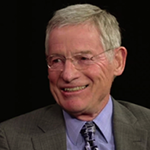

Harvey C. Mansfield is the William R. Kenan, Jr., Professor of Government at Harvard University. He was Chairman of the Government Department from 1973–1977, has held Guggenheim and NEH Fellowships, and has been a Fellow at the National Humanities Center. He won the Joseph R. Levenson award for his teaching at Harvard, received the Sidney Hook Memorial award from the National Association of Scholars, and in 2004 accepted a National Humanities Medal from the President. In 2007, he delivered the National Endowment for the Humanities’ Jefferson Lecture. He has hardly left Harvard since his first arrival in 1949, and has been on the faculty since 1962.
For more than forty years, Harvey Mansfield has been writing and teaching about political philosophy. His commentary “demonstrates the virtues that should guide scholars of the humanities,” writes Mark Blitz, a former student. Blitz explains those virtues as “patient exploration of the intention of a superior author, attention to other scholars and generosity to trailblazing teachers, brilliance and wit, and an eye toward what can improve us here and now.”
Mansfield examines both contemporary politics and their historical origins. His 14 books delve into the words of past thinkers such as Edmund Burke and Machiavelli, where he finds answers to puzzles such as why we believe today that political parties are respectable or desirable. The “Settlement of 1688,” Mansfield writes, “…resolved the religious issue by demoting it. . . . Party government required such a separation, because it was the operation of the religious issue in politics which caused great parties.”
Mansfield credits Machiavelli as the mastermind behind modernity. “I think he was responsible for the original insight behind the American presidency,” says Mansfield. “Our country is the first republic that had strong executive power, as previously it was thought that executive power was contrary to republican principles. But we managed to combine this princely power with the people’s authority.”
Mansfield grew up immersed in the field of politics—in New Haven, where his father was a professor of political science, and also in Washington, D.C., where his father worked for the Office of Price Administration during World War II. Mansfield remembers D.C. as an exciting place to be: “I saw many famous events, like Franklin Roosevelt’s funeral and the two parades, for victory in Europe and victory in Japan.” Years later, when he was an undergraduate at Harvard, a teaching assistant noted, “It’s in the cards for you to become a political scientist.” Mansfield recalls, “I don’t remember ever seriously considering any alternative.” He went on to earn his Ph.D. from Harvard in 1961, and began teaching there the next year.
Mansfield’s first book, Statesmanship and Party Government: A Study of Burke and Bolingbroke, came out in 1965. Since then he has published thirteen more books including three translations of Machiavelli and a translation of Alexis de Tocqueville’s Democracy in America, which he co-translated with his late wife Delba Winthrop. Articles and political analysis by Mansfield frequently appear in periodicals such as the Weekly Standard, the Wall Street Journal, the New Republic, the National Review, and the Times Literary Supplement.
Mansfield’s numerous awards include a Guggenheim Fellowship and a National Humanities Medal. He has served as a member of the Council of the American Political Science Association and the National Council on the Humanities, as a fellow of the National Humanities Center, and as president of the New England Historical Association. He lives in Cambridge, Massachusetts.